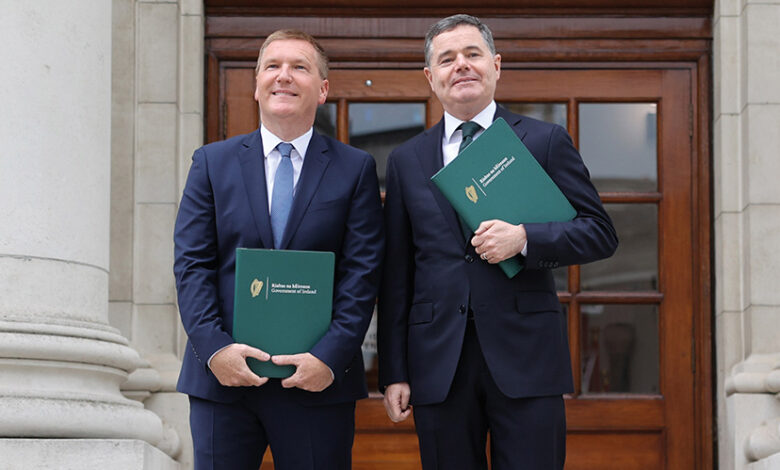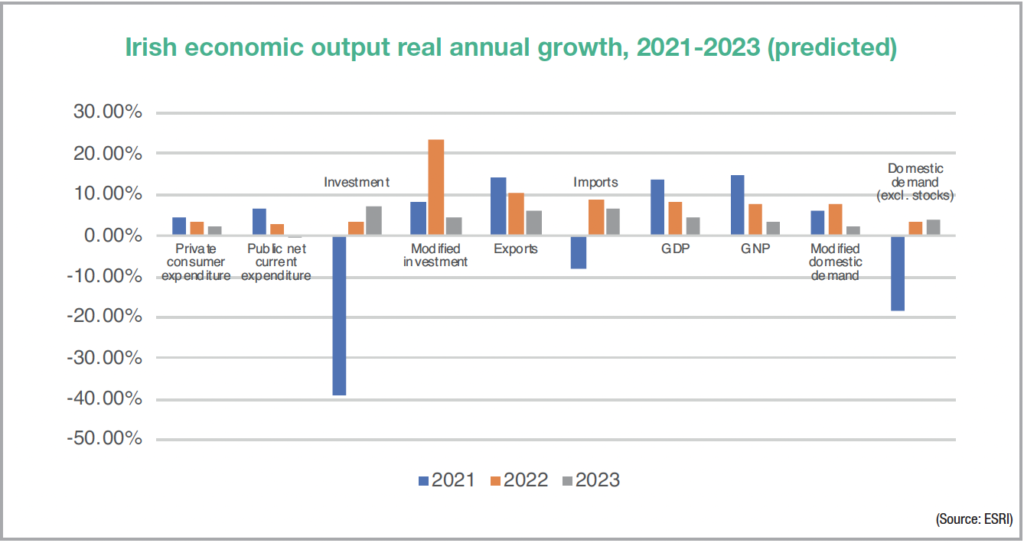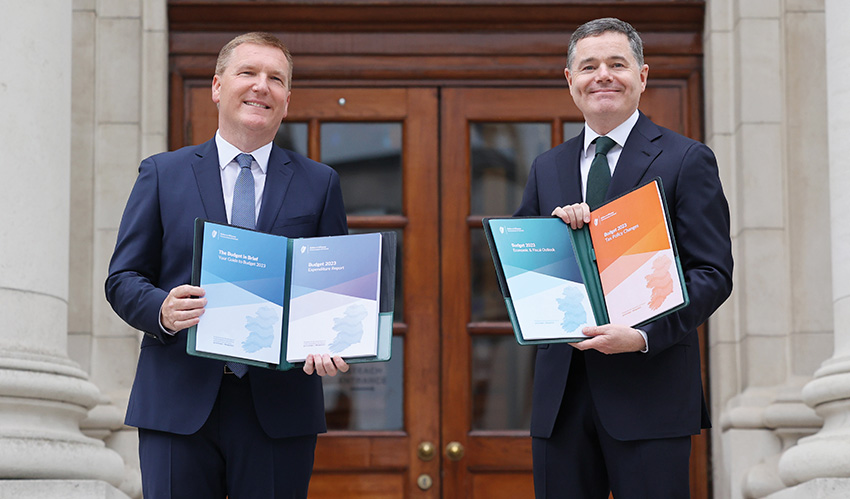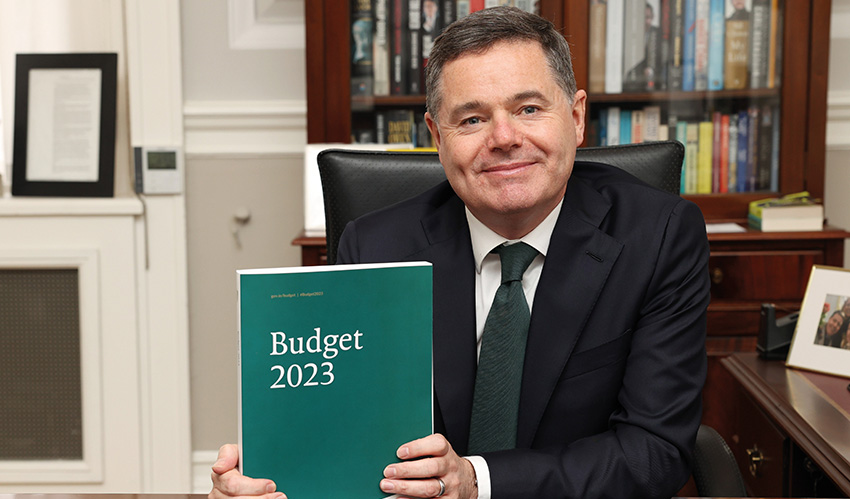
Budget 2023 has been billed as a cost-of-living budget, one that aims to tackle soaring energy prices and inflation rates not seen since the 1980s, and as Irish citizens feel the squeeze, the €11 billion package aims to “put money back into their pockets”.
Overview
The total size of additional spending and tax measures, along with one-off measures, included in Budget 2023 is expected to come close to €11 billion, with the Budget package accounting for approximately €7 billion and one-off measures set to come to almost €4 billion.
Such levels of investment, both at the one-off and sustained budgetary package level, were clearly needed to tackle an international economic environment that, on the back of the successive crises of the Covid-19 pandemic and its associated economic damage and the Russian invasion of Ukraine, is being swallowed by steeply increasing inflation, most acutely felt by households via skyrocketing energy prices. The intense nature of these pressures was perhaps reflected in the fact that Budget 2023 was unveiled two weeks earlier than the typical mid-October date.
The challenge for Budget 2023 will be to stay ahead of inflation and to not have its increased spending simply swallowed by price raises. Having forecast an inflation rate of 2.2 per cent for 2022 in Budget 2022, the Government is instead facing a rate of inflation forecast to be 7.8 per cent by the Central Bank and forecast by the Department of Finance to be 8.5 per cent for 2022 and 7 per cent for 2023. Such conditions made the cost of living the inescapable priority topic of Budget 2023.

Cost of living
Cost-of-living pressures have come from a multitude of directions, applying pressure on citizens from angles such as rent, energy prices, childcare, and social welfare payments not keeping pace with inflationary prices. To this end, Budget 2023 delivered a number of one-off measures designed to ease the pressure on Irish citizens: the child benefit payment will be paid at a double rate (€140 per child) in November 2022; a double week “cost of living support” payment was made to all social welfare recipients in October and the Christmas bonus will be paid lump sums of #in early December; Working Family Payment and Carer Support Grant recipients will be paid lump sums of €500 in November; and once-off payments of €200 will be made before Christmas to recipients of the Living Alone Allowance and €500 to recipients of disability allowance and the invalidity and blind pensions. Every social welfare recipient, including pensioners, will also receive an increase of €12 per week. In total, a social protection package of €2.2 billion was announced.
“Targeted welfare measures combined with universal household energy credits will do more for most lower income households this winter than had welfare payment rates risen in line with inflation both this year and next.”
Barra Roantree, ESRI Research Officer
In terms of energy and fuel costs, the fuel allowance means limit for over 70s was extended to €500 for single people and €1,000 for couples, with fuel allowance recipients also receiving an extra lump sum of €400 before Christmas. €600 in electricity credits will be paid to all household in instalments of €200, with the first set to be paid before Christmas. In an attempt on the Government’s part to ease rental pressures, taxpayers who rent will receive a tax credit valued at €500 per year from 2023 onwards, which can also be claimed in respect of rent paid in 2022.
€121 million of funding has also been delivered in order to fund a reduction of up to 25 per cent in the weekly fee for those availing of the National Childcare Scheme, with Minister for Public Expenditure and Reform Michael McGrath TD telling the Dáil that the measure “will put up to €175 a month, or €2,106 a year, back in the pockets of parents next year”.
Responses to the measures have been varied. The Economic and Social Research Institute’s (ESRI) post-budget briefing stated that the one-off cost-of-living measures will “insulate most households from inflation this winter”. Barra Roantree, ESRI Research Officer, said: “Our research shows the government’s approach to insulating households from the recent rise in energy prices has been effective. Targeted welfare measures combined with universal household energy credits will do more for most lower income households this winter than had welfare payment rates risen in line with inflation both this year and next.” The Parliamentary Budget Office’s (PBO) pre-budget commentary would appear to agree with this sentiment, stating: “Given the limited extra resources available, budget measures should be targeted towards those households most in need, given that rising costs show no signs of easing.”
However, Fórsa, the largest public sector public union, said that the childcare measures within the budget should have been more radical. “While the broader package of cost-of-living measures is welcome, reflecting the efforts of unions to impress upon the Government the need for such measures, childcare needs more than a temporary crisis intervention,” Kevin Callinan, Fórsa general secretary and Irish Congress of Trade Unions president, said. “Failure to tackle childcare comprehensively means a significant block remains to many parents, usually mothers, hoping to enter the workforce or to return to work after having children.”
Housing
Measures outlined in Budget 2023 to tackle an issue that long predates the rapid inflation of recent times, housing, include the extension of the Help-to-Buy Scheme on its current terms into 2024. In the rental market, while landlords have seen no change on the tax paid on rental income, they have seen the amount that they are able to claim for pre-letting expenses doubled to €10,000 and a reduction on the time that a property must be vacant for in order to be eligible from 12 months to six months.

Vacant homes will also be subject to a new tax that will apply to residential properties that are occupied for less than 30 days per year. Minister for Finance Paschal Donohoe TD, upon announcing the measure, stated that exemptions will apply to properties vacant for “genuine reasons” and that the tax will be self-assessed. A levy will also be introduced on concrete blocks and pouring concrete in a bid to raise €80 million a year. It will be applied from April 2003 at a rate of 10 per cent.
In an exchange following the outlining of the Budget measures, Donohoe defended the Government’s record on housing, stating that it had committed a record €4.5 billion for the public funding of social, affordable, and cost rental homes, but the Labour TD Ged Nash responded that the Government’s flagship Housing for All policy had been a “total failure”.
Health
The extension of free GP care to children aged six and seven that was pledged in Budget 2022 has been reiterated, while Minister of Health Stephen Donnelly TD also outlined plans for a free GP visit card scheme for low-income homes that will apply to roughly 360,000 adults. €10 million has been pledged to public funding of IVF treatments, including both private IVF and the development of public treatment, and free contraception has been extended to now include women aged 16-30.
Transport
A €3.5 billion support package has been pledged by McGrath in order to support the delivery of BusConnects, MetroLink, and DART+; while the €3.5 billion figure includes current expenditure, the €2.6 billion of capital funding within represents the highest level of capital investment in the sector since 2008.
The Government has also extended the current excise reduction of 21c per litre for petrol and 16c per litre for diesel.
“Failure to tackle childcare comprehensively means a significant block remains to many parents, usually mothers, hoping to enter the workforce or to return to work after having children.”
Kevin Cullinan, General Secretary, Fórsa
Education
The Department of Education has received a €9.6 billion allocation from Budget 2023, including a capital budget of €860 million. Such funding will go towards the provision of an additional 686 teachers – which will reduce class sizes by one pupil for the third consecutive year – and free school books for primary pupils. According to the Irish National Teachers’ Organisation (INTO), the fund of €90 million that has been established to provide an approximately 40 per cent increase in funding for schools in this academic year will mean that a 150-pupil primary school will receive a top-up of €11,250 to bring their allocated funding for this school year to €70,800.
Continued rollout of the NDP will see 150 school-building projects that are currently at advanced design or tender stage commencing construction in 2023. The INTO states that it expects the “majority” of the 300 construction projects currently in the construction phase to be completed in 2023.
Macroeconomic level
As part of an income tax package worth €1.1 billion, the top rate of tax (40 per cent) will now only apply to those on incomes above €40,000; personal tax credit will rise from €1,700 to €1,755 and the employee and earned income tax credit will increase by the same amount; and the second USC band is to be increased to €22,920 due to an increase in the minimum wage.
An additional €2 billion has been set aside for the “rainy day fund”, while a contingency fund of over €4 billion to deal with Brexit and Ukraine repercussions has also been put aside; the Government expects Budget 2023 to result in a surplus of €1 billion (0.4 per cent of GNI*), a move that notable economists such as Thomas Piketty have criticised in countries such as Germany and Japan in times of inflation, whereby it is argued that retention of profits further damages consumer confidence.

The PBO stated prior to the budget announcement that the “underlying fundamentals of the economy are strong, and the number of people in employment is up 200,000 from pre-pandemic levels with an unemployment rate of 4.2 per cent in July. Tax revenue is up 12.3 per cent (€7.3 billion) to end-August compared to last year, driven by strong corporation tax, income tax and VAT returns”. However, their commentary does note that the tax package “may underestimate the amount required just to standstill and maintain existing levels of service, due to high inflation in 2022” and that total current expenditure for 2023 would have to be “around €74.85 billion just to standstill at 2022 levels (accounting for 4.2 per cent inflation in 2023) and would need to be €78.87 billion to account for unexpected 2022 inflation combined with forecast 2023 inflation”; considering the Government’s own prediction of 7 per cent inflation in 2023, and the ESRI’s prediction of 6.8 per cent, the latter figure may be necessary.
The ESRI’s quarterly economic commentary for Q3 2022, published the week after the unveiling of the budget, says that despite “considerable uncertainty” around recession in the US, the UK and the EU, and “the growing possibility of energy supplies being rationed across Europe in the winter of 2023”, “the domestic economy is still expected to grow robustly this year”, to the tune of modified domestic demand growth of 7.5 per cent in 2022 and a fall in the unemployment rate to 4.1 per cent, registering a government surplus of 0.3 per cent. With the inflationary pressures predicted to remain at a high, but moderating level, the Government will be hoping that the ESRI’s prediction that the targeted supports will ease pressure on the cost of living proves correct; otherwise, the surpluses recorded in recent years may be called upon.





